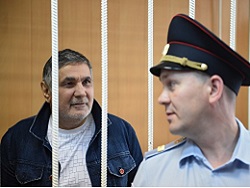
April 7, 2016 State Duma Deputy Irina Yarovaya, together with Senator Viktor Ozerov has introduced a draft Federal law On introducing amendments to the criminal code of the Russian Federation and the Criminal procedural code of the Russian Federation regarding the establishment of additional measures of counter-terrorism and public safety”, as well as the draft Federal law On introducing amendments to certain legislative acts of the Russian Federation regarding the establishment of additional measures of counter-terrorism and public security” (No. 1039101-6 , No. 1039149-6).
13 may 2016, the bills were adopted in the first reading, despite the comments of the Legal Department of the Duma and the Supreme Court.
The draft law “On amendments to the criminal code and Criminal procedure code of the Russian Federation regarding the establishment of additional measures of counter-terrorism and public safety”, as stated in the explanatory Memorandum, aims to create additional mechanisms to counter terrorist and other extremist manifestations, which will enhance the effectiveness of the system of detection, prevention and suppression of acts of terrorism and other forms of extremism. In particular, the criminal code of the Russian Federation proposed to add three new offences, which establishes liability for failure to report a crime of a terrorist nature, the promotion of extremist activities, as well as the Commission of an act of international terrorism. In addition, the circumstances aggravating criminal punishment is proposed to include the Commission of a crime in armed conflict or hostilities. The bill introduces a number of offences for which liability arises on reaching 14 years, terrorist crimes, which are committed intentionally and are a particular danger to society.
For a number of criminal charges increased responsibility. Under article 205 of the “act of terror” a term of imprisonment will be 10 years instead of 8 years as it is now (the upper limit remains at 15 years — as regards 1 article 205). Changing part 3 of article 205.1 “Facilitating terrorist activity” and substantially increases the sanction, along with aiding in a terrorist act (article 205) appears as an accessory to the hostage-taking by an organized group with serious consequences (part 3 of article 206), in the creation of an illegal armed community. All of this shall be punishable by deprivation of liberty for a term from 15 to 20 years with restriction of liberty for a term from one year to two years.
In articles 205 and 205.2 “Public calls to terrorist activity or public justification of terrorism” is installed the bottom bracket of a fine of 100 thousand rubles, excluded forced labor, and imprisonment remains the. Of penalties for public calls to terrorist activity or public justification of terrorism committed through the media or Internet, are also eliminated forced labor and installed the bottom bracket to imprisonment ranging from 5 to 7 years.
Participation in the activities of the organization, which in accordance with the legislation of the Russian Federation as terrorist (part 2 of article 205.5), is proposed to punish by imprisonment for the term from 10 to 20 years, not 5 to 10 years, as specified in the current edition of the Criminal code of the Russian Federation. Increase the responsibility for the creation of an illegal armed formation and participation: increase the lower limits of imprisonment.
Toughen responsibility for extremist articles. In the article 282 “inciting hatred or hostility, and humiliation of human dignity” provides no alternative sanctions to deprivation of liberty, the deadlines increase. The same picture with the changes in article 282.1 “Organisation of an extremist community”, 282.2. “Organization of an extremist organization”, 282.3 “Financing extremist activities: fines and forced labor are eliminated, the terms of imprisonment are growing.
Appropriate changes in the procedural law, however, they are not only technical in nature, and these changes also have comments.
<hr/>
FAILURE TO REPORT A CRIME
Yarovaya proposes to Supplement the criminal code a new article 205.6 “not informing about a crime”. Responsibility (from a fine to imprisonment) can occur if a person authentically knew about preparing or committed crimes and didn’t report it to the police. This rule applies to the following offences: an act of terrorism, assisting terrorist activities, public calls to terrorist activity or public justification of terrorism, training for terrorism, organization of terrorist community and participation, the organization of activities of a terrorist organisation and participation in the activities of an organization, hostage taking, organization of an illegal armed formation or participation in it, hijacking an aircraft, sea vessel or railway rolling stock, illegal handling of nuclear materials or radioactive substances, theft or extortion of nuclear materials or radioactive substances, an encroachment on life state or the public figure, the violent seizure of power or forcible retention of power, armed rebellion, an attack on persons or institutions that enjoy international protection, the act of international terrorism.
A person shall not be criminally liable for not informing about the crime committed by his spouse or close relative (this corresponds to part 1 of article 51 of the Russian Constitution).
The choice of these types of crimes are justified in the explanatory Memorandum. The list includes crimes against public security, against the constitutional order and security of the state, against the peace and security of mankind. However, the crimes included in the list selectively, not all crimes in a row from one Chapter.
In fact, the legislator encourages whistleblowing by introducing liability for failure to inform. How can I apply a new article about the failure to report a crime? How bodies to identify people who had reliable information about imminent or committed crimes? If the man himself had prepared such a crime and not reported it to the police, will he be the offender? Probably not, because the same article 51 of the Constitution. Who else can be a subject of this crime? Friends, acquaintances, neighbors, fellow villagers. Thus, it introduces a kind of Esprit de corps, for example, for residents of the village, which was occupied by the terrorists. But as of these residents will be selected those who will be responsible for the non-information? How to prove that the man had known of the impending crime?
Composition formulated in such a way that the form of guilt can be only in the form of intent, direct or indirect. That is, the person realized the social danger of his actions (inaction), foresaw the possibility or inevitability of the onset of socially dangerous consequences and wished their occurrence, or did not wish, but consciously allowed these consequences or treated them indifferently. It is more likely that this crime could be committed with indirect intent. However, as to ignore the fact that people might not report the crime out of fear for his life?
Perhaps this article will be revealing applied a couple of times in order to motivate the population to work more actively with the authorities. While it is hoped that the constant mass and this article should not be applied.
The legal Department of the Council also notes that the proposed size of the punishment for committing the crime mentioned above the sizes of the respective kinds of penalties prescribed for in advance not promised concealment of especially serious crimes (article 316 of the criminal code). However, in contrast to the failure of the crime concealment is expressed in the active actions directed on concealment of the crime, guns, tools, and traces of crime, objects obtained by criminal means, as well as persons who committed a crime and therefore the penalty for its Commission should be more strict.
<hr/>
THE PROMOTION OF EXTREMIST ACTIVITIES
It is proposed to introduce into the criminal code a new article 282.4 “Promotion of extremist activities” (by analogy with article 205.1 of “Facilitating terrorist activity”). Under the assistance means the declination, recruitment or other involving of the person in the Commission of extremist crimes. Such crimes article 282.4 include: public appeals to extremist activity, public calls for action aimed at violating the territorial integrity of the Russian Federation, inciting hatred or hostility, and humiliation of human dignity, the funding of extremist activities.
The legal Department of the State Duma drew attention to the inadequacy and injustice of punishment, which suggests this article. It is evident that for a new article higher responsibility than similar articles of the Criminal code of the Russian Federation, and in addition, introduced non-alternative sanctions to deprivation of liberty.
The Duma lawyers are against the introduction of uncontested sanctions. In conclusion, the Legal Department noted that “the proposal for an uncontested penalty of imprisonment for committing crimes stipulated in articles 282 — 282.3 of the criminal code… will not allow for the differentiation of criminal responsibility and individualization of means of criminal legal impact on a person guilty in committing these crimes. The exclusion of such a punishment of forced labor from the sanctions of the first and second paragraphs of article 205.2 of the criminal code, where in addition to forced labor provides for only the penalty of fine and imprisonment, will lead to narrowing the opportunities for the court to appoint punishment not connected with deprivation of freedom for committing these crimes.”
<hr/>
AN ACT OF INTERNATIONAL TERRORISM
Under an act of international terrorism bill understands the Commission outside the territory of the Russian Federation of an explosion, arson or other acts endangering life, health, liberty or inviolability of citizens of the Russian Federation, to disturb the peaceful coexistence of States and peoples or against the interests of the Russian Federation, as well as a threat to their Commission. The first part of article 361 stipulates the list of actions: committing explosion, arson or other actions — are similar to those contained in the first paragraph of article 205 “act of terrorism” of the criminal code, but committed outside the territory of the Russian Federation.
The legal Department of the Duma compares the sanctions in these articles and comes to the conclusion that the new sanctions disproportionately higher, even though “the place of Commission of a terrorist act cannot be the basis for establishing such a substantially different size (maturity) of measures of criminal responsibility”.
Generally, criminal law operates on a territorial basis, that is, punishing persons on the territory of the Russian Federation for acts committed in the territory of the Russian Federation. The criminal code provides for cases when the criminal law applies to persons who committed a crime outside the Russian Federation. New article just falls under such cases. The basic conditions here are committing a crime against the interests protected by the criminal code, and that person has not incurred responsibility for this act in a foreign country and prosecuted in Russia.
In General it can be assumed that this article may be used, for example, in terrorist acts against the Russian objects abroad (e.g., military bases, embassies and other).
<hr/>
THE CTO REGIME
According to the second draft Federal law On introducing amendments to certain legislative acts of the Russian Federation regarding the establishment of additional measures of counter-terrorism and public security” Law “On counteracting terrorism” is supplemented by provisions about the possibility of creating special coordinating bodies for the fight against terrorism, spells out the powers of local authorities.
The bill expands the cases of the introduction of the counter-terrorist operation (hereinafter — WHO). Now the CTO regime is introduced for the purpose of suppressing and disclosing terrorist act, minimize its consequences and to protect the vital interests of individuals, society and the state. According to the project CTO may be imposed in order to deter and solve crimes of a terrorist orientation (the hostage taking, the encroachment on life state or the public figure, the hijacking of aircraft or a vessel, the violent seizure of power, armed rebellion and other).
Particularly noteworthy is that the regime WHO can be introduced to prevent the violent seizure of power and armed rebellion. This may indicate that the bill is intended to deal with possible attempts of the orange revolution in Russia.
<hr/>
DEPRIVATION OF CITIZENSHIP AND THE BAN ON TRAVEL
The Spring project is proposed to establish the basis for cancellation of the decision on acquisition of citizenship of the Russian Federation in the case of a person’s conviction to the punishment for committing one of the terrorist crimes, except in cases of absence of the individual concerned has another nationality or guarantees of its acquisition.
However, the provision allowing for the termination of citizenship of the Russian Federation without the free will of the citizen, is inconsistent with the principles of Russian citizenship and the regulations governing citizenship of the Russian Federation, established by article 4 of the Federal law “On citizenship of the Russian Federation” according to which the citizen of the Russian Federation cannot be deprived citizenship of the Russian Federation or the right to change it.
The specified radix is set only for Russian citizens with dual-citizenship. However, according to the constitutional principle of a citizen of the Russian Federation citizenship of a foreign state does not diminish his rights and freedoms. It is obvious that the introduced differentiation was inconsistent with the principle of proportionality of limitations on constitutional rights under the Federal law (which was emphasized by the constitutional Court in the order dated 26.12.2005 № 14-P).
Article 9 of the bill proposes to restrict the right of a citizen of the Russian Federation on departure from Russia in case of presence of warning about the inadmissibility of violation of the law. In the opinion of the Legal Department of the state Duma, this provision is also inconsistent with the principle of proportionality of the imposed restrictions, since the warning about the inadmissibility of violation of the law is directed to prevent offences. According to the legal positions of the constitutional Court of the Russian Federation, expressed in its decisions, the constitutional protection of the significant values suggests the possibility of reasonable and proportionate limitations on rights and freedoms of man and citizen, with a fair ratio of public and private interests, without derogating these rights and freedoms; relevant pravoohraniteli justified named in article 55 (part 3) of the Constitution of the Russian Federation public interest, if they are caused by such interests and is able to provide socially necessary result; in determining the conditions of realization of fundamental rights and their possible restrictions, the Federal legislator must, proceeding from the principle of equality and the ensuing test of reasonableness, of necessity and proportionality, to ensure the balance of constitutional values and the rights and legitimate interests of participants of concrete legal relationship (judgement of 18 February 2000, № 3-P, dated 14 November 2005, No. 10-P, dated 26 December 2005, No. 14-P from July 16, 2008 n 9-P, dated 7 June 2012 № 14-P and others).
<hr/>
OTHER STORIES
Article 4 of the bill proposes to Supplement the code of administrative offences with a new article 11.14.3 “Failure to comply with obligations stipulated by legislation on transport security”. In part 1 of article 11.14.3 the administrative code establishes liability for the violation by the carrier of the order of organization of rendering of forwarding services. However in the Federal law “On forwarding activity” of such a procedure is not provided. This article from the Legal Department of the state Duma a lot of comments. However, the most important thing here is that the establishment of administrative responsibility for violation of all duties imposed by the law on forwarding activity, does not correspond to the subject of regulation of the bill, which is to introduce additional measures to fight terrorism and ensure public safety.
The Russian government gave a positive opinion on the bill, putting one short comment. Comments from the Legal Department of the State Duma was much more. The Supreme Court did not support the idea of the bill, his observations largely coincide with the observations of the Duma lawyers. The Supreme Court opposed the uncontested sanctions and disproportionate punishment. Also in the Supreme Court believe that the rejection of non-custodial punishment would not allow the courts to ensure the principle of individualization of punishment — the infliction of punishment taking into account the specific circumstances of the crime, the role of the person in its Commission.
Against the bill were made by the presidential Council on human rights and a number of deputies. However, for the bill in the first reading 287 deputies voted (64%) and only 7 deputies voted against.
<hr/>
INSIGHTS
1. From the explanatory notes to the bill imply that the implementation of the law will enhance guarantees of security of life and health of citizens and to counteract any forms of involvement in criminal activity. For citizens, far from terrorist and extremist activities, that must be achieved for a new criminal offense “failure to report a crime and intimidation of potential terrorists. For citizens employed directly by terrorism and extremism, increase risks to serve more than planned (if they even survive in the WHO). For foreign terrorists there is a risk of losing citizenship (provided they have other citizenship along with Russian). Can we assume that such measures are consistent with the stated objectives of the bill? It appears that not fully.
2. Experience shows that toughening responsibility for extremism and terrorism not all stops from committing crimes. Methods of terrorist recruitment can be used to bypass the conscious fear of citizens before the Penal code. This increase in responsibility directly for terrorism and extremism in General can be considered more or less adequate measure.
3. The introduction of the responsibility for not informing about the crime can not be considered a good idea of the authors of the bill. It is not clear who and how it is intended to prosecute under this article. This rule brings us back to the calling disgust the practice of “squealing” and is not conducive to the growth of citizens ‘ awareness.
4. Unconstitutional sentences legislators about the deprivation of citizenship and restrictions on the right to check-out puzzling. It is hoped that these standards will be further excluded from the project.
5. Spring bills are not only aimed at toughening responsibility for crimes of terrorist orientation. They also expand the possibilities for use of the CTO regime, which could be introduced to prevent the violent seizure of power and armed rebellion. Thus, this bill can be put on a par with laws designed to prevent an orange revolution in Russia. On the one hand, we cannot deny the importance of preventing violent events, but on the other, we need a mechanism that protects against abuses possible with the introduction of WHO.
6. Since the bills received a positive opinion of the Russian Government and already passed the first reading, they have every chance of adoption.








